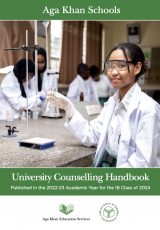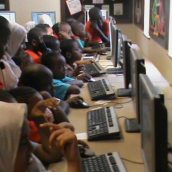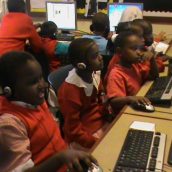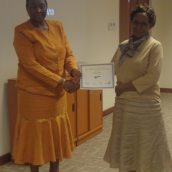Abracadabra: A Literacy Spell
The magic behind the Aga Khan Academy, Mombasa’s use of the ABRACADABRA early literacy software began in 2010.
It all started when Montreal’s Concordia University hosted the Aga Khan Foundation, Canada for AKF’s exhibition “Bridges That Unite.” After further interaction and discussion between the institutions, they decided to pilot a project to use innovative technology to support early English literacy in Mombasa, Kenya.
The ProgramThe project involved establishing a partnership between the Aga Khan Academy in Mombasa and Concordia’s Centre for the Study of Learning and Performance (CSLP) to use the ABRACADABRA (ABRA) software to strengthen literacy skills of children in Kenyan schools.
ABRA is a free, interactive web-based literacy program designed for lower primary level students and their teachers and parents. Concordia’s CSLP developed and validated the program to help address the problem of alarmingly low global literacy rates. ABRA teaches via digital stories and interactive activities while offering support in skills such as reading comprehension and writing.
Two phases of the project are complete, and a third is underway.
In the first phase, six local Mombasa English teachers and their grade two classes used the ABRA software in the Academy’s Junior School computer lab over a 13-week period. Another set of six teachers and their students acted as a control group, learning the same content under normal conditions at their schools. In the second phase, the control group worked with the software in the computer lab. Throughout the process, the teachers received support from local master teachers from the Aga Khan Academy, Mombasa as well Concordia’s CSLP team in Montreal. Both phases were successful beyond expectations.
In 2013, CSLP received a grant from the Social Science and Humanities Research Council of Canada to continue the project into a third phase with the goal of reaching a wider range of students and teachers.
Successes and Challenges
For Prof. Phil Abrami, the Director of the CSLP, and Anne Wade, CSLP’s Manager and Information Specialist, using the ABRA programme in Kenya has not been without obstacles. But the successes have far outweighed the challenges.
“Working at a distance always poses challenges – just logistically, phone calls that don’t go through, Skype connections that drop, shipping materials over great distances, and so on,” said Phil and Anne. Such technology limitations, they said, make using ABRA in Kenya more challenging than in the other countries they have worked in.
Despite this, they are exceptionally pleased with the teaching and learning improvements, not only with respect to literacy – as evidenced by post-test scores – but also across other subjects, indicated by higher scores on national curriculum tests. And the enthusiasm and engagement of teachers, school administrators, government officials and Aga Khan Academy staff have been palpable.
Benefits of the Partnership
The partnership between AKA, Mombasa and the CSLP at Concordia is mutually beneficial.
“This project could not succeed without the active and ongoing involvement of the Aga Khan Academy and its true support for community outreach,” Phil and Anne said. “Not only does the Academy provide space, it encourages its staff to engage meaningfully in community activities, in this case by developing and supporting a programme of teacher professional development via technology integration.”
Jonathon Marsh, on the Aga Khan Academy side, agreed: The joint project exemplifies the “alignment within the vision and mission of the two organisations that brought us together.”
ProgressThe project has grown substantially since its launch two years ago, and is now establishing 17 training hubs in Mombasa, Malindi, Nairobi and the Rift Valley.
While this has increased logistical complexities, the potential for positive impact is significant, noted Jonathon.
“There is a willingness and a growing enthusiasm within the country for teachers to have better access to ICT tools and to be able to use those tools more effectively to support student learning,” he said.
“We’ve seen very positive results in the student data, which indicate that students using the software not only do better with regard to literacy gains, but their achievement across all of their subjects is also significantly higher,” Jonathon said. “We’ve had a great response from teachers using it who are astounded to discover that kids who they thought couldn’t read were actually quite able to learn when you found the right ways to motivate them.”
Teacher Impressions
Terry Muthoni
Terry Muthoni, an IT postgraduate student, uses ABRA in training sessions with teachers and with her daughter at home. Her experience with ABRA influenced her to pursue further studies in education.
“This is the only tool that I have encountered so far, that supports the children, parents and teachers with related information, resources and guides on the same platform,” she said. “The program opened my eyes to a different view of the education sector and the impact of having good foundational skills and competencies in early childhood literacy, something that is often taken for granted.”
Rosemary Waga
Rosemary Waga encountered ABRA through a workshop at the Aga Khan Academy and continues to use the programme in her class and in teacher training.
With ABRA, “It is easy to monitor what the students are doing by going to the teacher’s portal…to see their strengths and their weak areas and how to address them,” she said.Rosemary witnessed this firsthand when one student who often had difficulty, began reading on her own with relative ease.
“She even read a book I had picked for her,” Rosemary said. “I was very excited.”
Rosemary also spends time visiting other schools, monitoring their ABRA use and exchanging experiences with other teachers.
“ABRA has changed the way I think about learning, because most of the time teachers like to brand students, saying that they are slow learners, incapable and so on,” she said. “These students need to be understood, and they also need to learn at their own pace, and ABRA lets students learn at their own pace until the objective is achieved.”
The Future
Phil and Anne have hopes for larger scale impact.
“We hope to dramatically enhance the essential educational competencies of young boys and girls throughout Kenya and other developing countries in Africa and the Middle East,” they said.
They also envision taking on tasks beyond literacy with the help of the Aga Khan Academy.
“We want to ensure high quality implementations and sustained use over time. While literacy is the single most important educational competency, there are other important skills, such as numeracy and inquiry, which we look forward to working on with our partners. In that regard, we see a continued expansion and strengthening of our partnership with the Aga Khan Academy as vital to our future plans.”
For those interested in learning more about ABRACADABRA please visit:
http://doe.concordia.ca/cslp/ltk or watch the video here
By Farah Mohamed
publications







